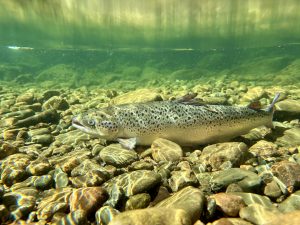The Atlantic Canada Fish Farmers Association (ACFFA) today released the final report of its cooperative pilot project on the evaluation of well-boat technology to deliver sea lice treatments. The evaluation determined that using well-boats can reduce the amount of approved product needed to treat sea lice by approximately 75 per cent compared to treatments delivered in skirted net pens.
The study also found that treatment efficacy is significantly increased when well-boats are used and that Interox Paramove 50, an environmentally benign hydrogen peroxide product, is highly effective in treating most stages of sea lice.
“Our well-boat pilot project has been a huge success,” says Pamela Parker, Executive Director of the Atlantic Canada Fish Farmers Association. “New Brunswick salmon farmers are so impressed with the technology that local companies have invested millions of dollars in purchasing their own well-boats for use this year and have leased a third for use in 2011.”
Sea lice are a naturally occurring parasite that affects wild and farmed fish alike and are not an issue in all farming areas. New Brunswick salmon farmers are leading the way in developing and implementing effective, innovative and sustainable treatment and management strategies for this parasite. Well-boats are large vessels that contain holds, or wells, that are filled with water and then the fish are pumped onboard for sea lice treatment.
Three well-boats – the Ronja, Ronja Carrier and Colby Perse – began delivering treatments this spring, said Parker, adding these treatments are being done using only hydrogen peroxide. Last year’s pilot project saw the ACFFA bring well-boat technology to Canada for sea lice treatments the first time by chartering one well boat – the Ronja Carrier – on behalf of a cooperative of all salmon farming companies in the region.
“Atlantic Canada’s fish farmers are committed to building a world-class, sustainable aquaculture industry. Besides investing in well-boats, they are investing in a number of research projects to explore other non-chemical treatment options like cleaner fish and sea lice traps. We’re always looking for innovative ways to address the challenges our industry faces,” said Parker. “This pilot project was a strong step forward for our industry.”
To read the Evaluation of Well Boat Technology Project Final Report, please click here.
The Atlantic Canada Fish Farmers Association, formerly known as the New Brunswick Salmon Growers’ Association, is an industry-funded association that works on behalf of the salmon farming industry in New Brunswick and Nova Scotia. The ACFFA represents salmon producers in the Maritime region in addition to a wide range of supporting companies and organizations.
